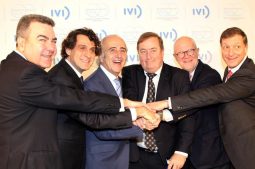Sustainability at IVI has always been one of our priotities. In the past month of April, the 10th IVIRMA Congress took place in Malaga. It’s a globally recognized event in the field of assisted reproduction. Over several sessions, more than 1,500 attendees became acquainted with the future pillars of reproductive medicine. The whole event was done in accordance with our environmental sustainability strategy, based on the Sustainable Development Goals (SDGs) proposed by the United Nations.
On World Environment Day, we share with you the measures implemented at the congress and the objectives achieved. We are going to talk about IVIRMA’s commitment to the international community and civil society, regarding environmental sensitivity and sustainability.
Reducing the Carbon Footprint at the Congress
At the 10th IVIRMA Congress, we have offset 100% of the CO2 emissions generated, totaling 132 tons. This reflects our commitment to reducing the carbon footprint. The project through which this was carried out aims to conserve the Amazon rainforest in Peru.
Vicky Vila, Head of Sustainability at IVIRMA Global, explains our sustainability objective as follows: “Sustainability has guided IVIRMA Global’s way of thinking and operating since the company’s inception. Every day, we work to make it more tangible. The IVIRMA Congress is a clear example as it has helped us create a scientific, social, and environmental legacy in Malaga. Therefore, our strategic priorities focus on transforming our organization into a catalyst for social change through an unwavering commitment to health and stakeholders.”
More actions to mitigate climate change
All the actions carried out in this context are part of the sustainability IVI’s plan that has four main pillars. First is the fight against climate change and its effects, followed by circular economy, people, and natural resources.
During the 10th IVIRMA Congress, we have reduced material consumption by incorporating criteria for recovery, reuse, and recycling. We have also optimized the use of available energy and improved water consumption efficiency.
Circular economy: Zero Waste philosophy
To ultimately achieve this goal, various actions were designed to make the 10th International IVIRMA Congress a paperless conference:
- 360 Digitalization: A mobile application has allowed attendees to access the daily schedule, eliminating the need for paper handouts. Additionally, scientific posters were available for viewing on screens.
- Companies with booths contributed to material optimization and reuse. The congress organization provided them with a series of recommendations, and the booth that implemented them best was recognized.
- Waste management and recycling, thanks to proper waste separation.
- Distribution of reusable bags to attendees, thanks to the collaboration between JUNO Genetics and the company “Proyectos Extraordinarios”, which transforms waste into valuable products. These bags were 100% sustainable as they were made from recycled sailcloth, recycled cotton, and PET thread. Furthermore, their production created sustainable employment opportunities for women facing difficulties accessing the job market in Spain and Africa.
People: Equality and Inclusivity
This pillar of the plan was implemented through various initiatives with the common goal of including groups at risk of exclusion, in collaboration with the ADECCO Foundation. Additionally, all physical accessibility barriers were eliminated in the spaces where the congress took place.
Social impact has also been prominent in this edition of the IVIRMA Congress, thanks to collaboration with various NGOs that promote local projects in Malaga. Attendees voted among several options to allocate a €3,000 donation. Ultimately, Cienciaterapia, an association dedicated to scientific outreach in pediatric oncology units in Spain, was selected.
Furthermore, a donation of one euro per attendee was made to the Deméter Association, based in Malaga but with a national scope. This NGO provides comprehensive care and intervention for girls and boys who have experienced situations of gender violence.
Natural Resources
Regarding resources, during the congress, all attendees received sustainable bottles and had access to water sources located at various points. This allowed us to minimize the use of disposable or plastic containers and promote efficient water usage.
Moreover, local suppliers were chosen for the congress at all times, including zero-kilometer food suppliers. All of this has helped us become more environmentally and socially sustainable.
“Choosing a sustainable event creates a positive impact on the environment and the community where it takes place. That is why we have been designing the Congress with sustainability criteria for four editions now. As global leaders in Assisted Reproduction, we also seek innovation in how we approach sustainability,” concludes Vila.





Comments are closed here.